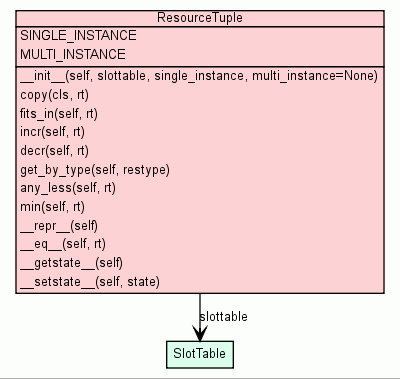Class ResourceTuple
source code

A resource tuple
This is an internal data structure used by the slot table. To
manipulate "quantities of resources" in Haizea, use Capacity
instead.
A resource tuple represents a quantity of resources. For example,
"50% of a CPU and 512 MB of memory" is a resource tuple with
two components (CPU and memory). The purpose of having a class for this
(instead of a simpler structure, like a list or dictionary) is to be able
to perform certain basic operations, like determining whether one tuple
"fits" in another (e.g., the previous tuple fits in "100%
of CPU and 1024 MB of memory", but in "100% of CPU and 256 MB
of memory".
A resource tuple is tightly coupled to a particular slot table. So, if
a slot table defines that each node has "CPUs, memory, and disk
space", the resource tuples will depend on this definition (the
specification of valid resources is not repeated in each resource tuple
object).
Resources in a resource tuple can be of two types: single instance and
multi instance. Memory is an example of a single instance resource: there
is only "one" memory in a node (with some capacity). CPUs are
an example of a multi instance resource: there can be multiple CPUs in a
single node, and each CPU can be used to satisfy a requirement for a
CPU.
|
|
|
|
bool
|
fits_in(self,
rt)
Determines if this resource tuple fits in a given resource tuple |
source code
|
|
|
|
incr(self,
rt)
Increases the resource tuple with the amounts in a given resource
tuple |
source code
|
|
|
|
decr(self,
rt)
Decreases the resource tuple with the amounts in a given resource
tuple |
source code
|
|
|
int
|
|
|
int
|
any_less(self,
rt)
Determines if any amount of a resource is less than that in a given
resource tuple |
source code
|
|
|
|
min(self,
rt)
Modifies the resource amounts to the minimum of the current amount
and that in the given resource tuple |
source code
|
|
str
|
|
str
|
__eq__(self,
rt)
Determines if the resource tuple is equal to a given resource tuple |
source code
|
|
|
|
__getstate__(self)
Returns state necessary to unpickle a ResourceTuple object |
source code
|
|
|
|
|
|
Inherited from object:
__delattr__,
__format__,
__getattribute__,
__hash__,
__new__,
__reduce__,
__reduce_ex__,
__setattr__,
__sizeof__,
__str__,
__subclasshook__
|
|
|
SINGLE_INSTANCE = 1
|
|
|
MULTI_INSTANCE = 2
|
|
SlotTable
|
slottable
Slot table
|
|
list
|
_single_instance
Resource quantities
|
|
dict
|
_multi_instance
Resource quantities
|
|
Inherited from object:
__class__
|
__init__(self,
slottable,
single_instance,
multi_instance=None)
(Constructor)
| source code
|
Constructor. Should only be called from SlotTable.
The constructor is not meant to be called directly and should only be
called from SlotTable.
The res parameter is a list with the quantities of each resource. The
list starts with the single-instance resources, followed by the
multi-instance resources. The slottable contains information about the
layout of this list:
-
The mapping of resource to position in the list is contained in
attribute
rtuple_restype2pos of the slottable.
-
For single-instance resources, the position returned by this mapping
contains
the quantity.
-
For multi-instance resources, the position returns the
quantity of the first instance. The number of instances of a given
resource is contained in attribute rtuple_nres of the slottable.
-
The number of single-instance resources is contained in attribute
rtuple_len of
the slottable.
- Parameters:
slottable (SlotTable) - Slot tablesingle_instance (list) - Quantities of single instance resourcesmulti_instance (dict) - Quantities of multi instance resources - Overrides:
object.__init__
|
|
Creates a deep copy of a resource tuple
- Parameters:
- Returns: ResourceTuple
- Copy of resource tuple
|
|
Determines if this resource tuple fits in a given resource tuple
- Parameters:
- Returns: bool
- True if this resource tuple fits in rt. False otherwise.
|
|
Increases the resource tuple with the amounts in a given resource
tuple
- Parameters:
|
|
Decreases the resource tuple with the amounts in a given resource
tuple
Precondition: rt must be known to fit in the resource tuple (via
fits_in)
- Parameters:
|
|
Gets the amount of a given resource type.
- Parameters:
restype (str) - Resource type - Returns: int
- For single-instance resources, returns the amount. For
multi-instance resources, returns the sum of all the instances.
|
|
Determines if any amount of a resource is less than that in a given
resource tuple
In the case of multi-instance resources, this method will only work
when both resource tuples have the same number of instances, and makes
the comparison instance by instance. For example, if a CPU resource has
two instances A and B: ___A__B_ R1|75 50 R2|50 75
R2.any_less(R1) returns True. However:
___A__B_ R1|75 50 R2|75 50
R2.any_less(R1) returns False, even though one instance (R2.B) is less
than another (R1.A)
- Parameters:
- Returns: int
- True if these is any resource such that its amount is less than
that in rt.
|
|
Modifies the resource amounts to the minimum of the current amount and
that in the given resource tuple
As in any_less, for multi-instance resources this method will only
work when both resource tuples have the same number of instances, and
makes the change instance by instance.
- Parameters:
|
|
Creates a string representation of the resource tuple
- Returns:
str
- String representation
- Overrides:
object.__repr__
|
|
Determines if the resource tuple is equal to a given resource
tuple
- Returns:
str
- True if they equal, False otherwise
|
|
Restores state when unpickling a ResourceTuple object
After unpickling, the object still has to be bound to a slottable.
|

